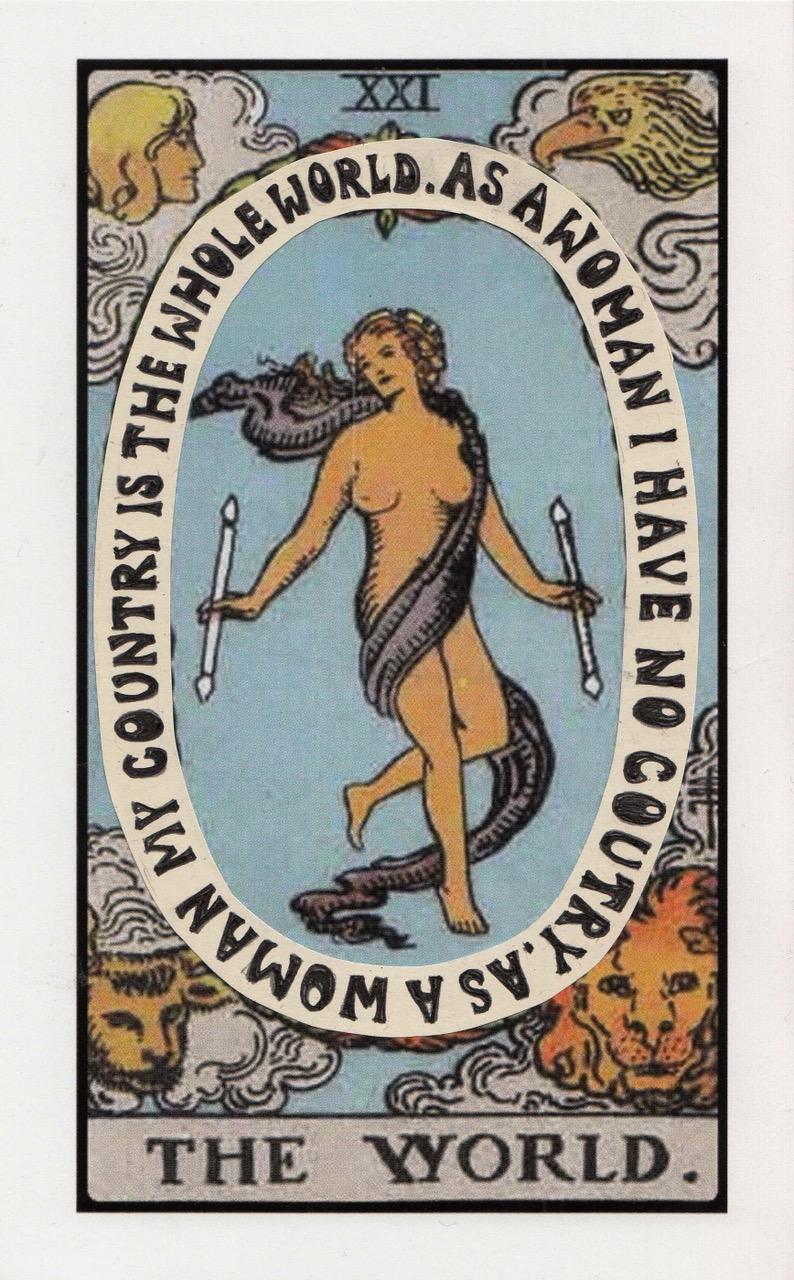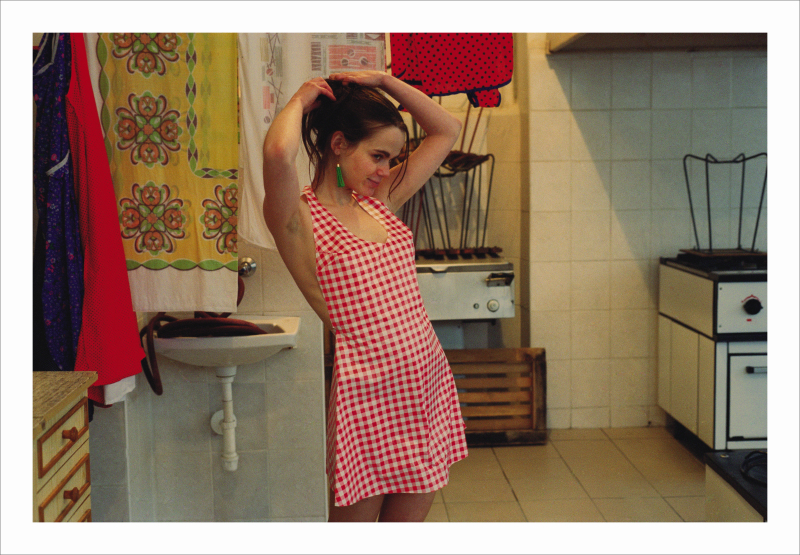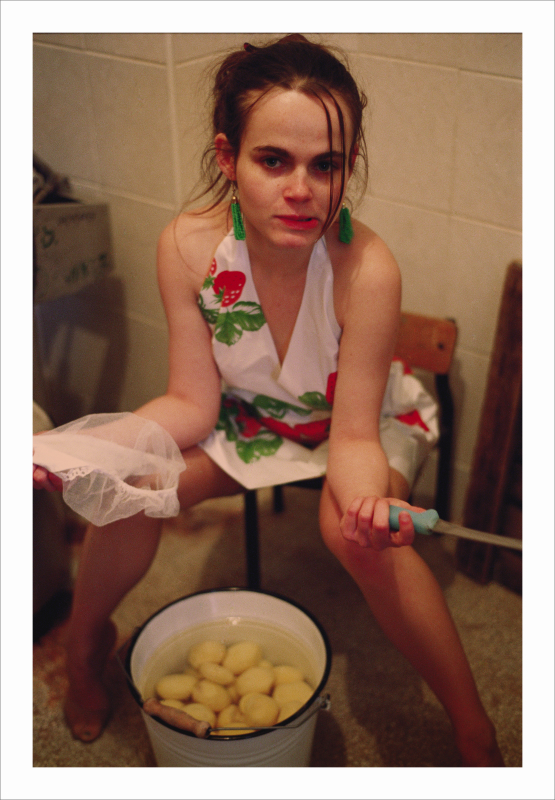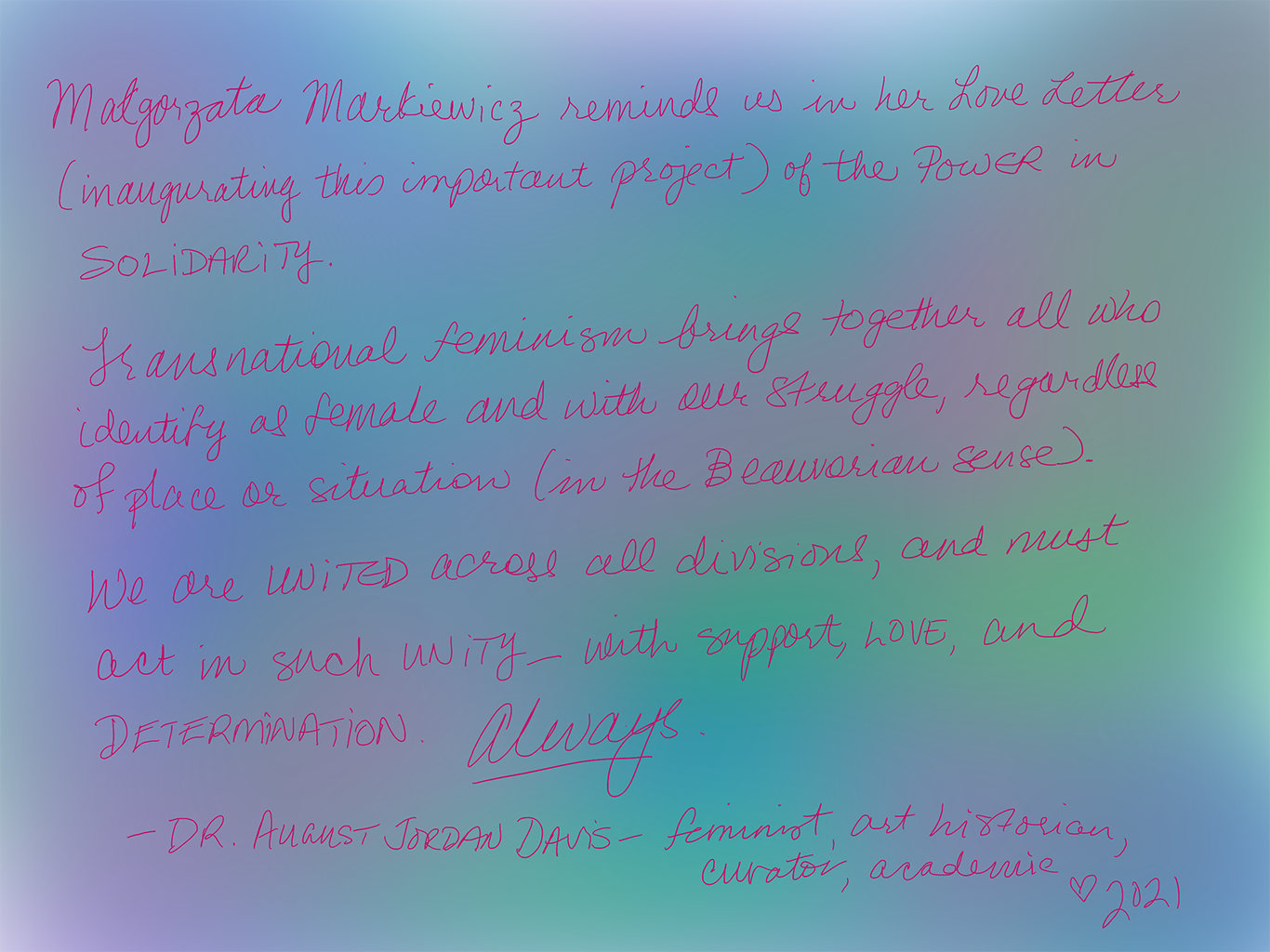10 April—02 July 2021
Online

Tribute to Virginia Woolf, 2018/2019
Collage, paper, drawing, format: 23cm x 13cm;
also available as print on fabric 100cm x 62cm.
Price on request emailing info@almanacprojects.com
As first correspondent for Love Letters, Basia Sliwinska and Astrid Korporaal invite Małgorzata Markiewicz. Support the All-Poland Women’s strike by purchasing the editions, and the artists through their works (price on request by emailing info@almanacprojects.com).
Tribute to Virginia Woolf
Virginia Woolf’s Three Guineas (1938), published when the rise of fascism was leading towards the outbreak of the Second World War, is a text that is still urgent today. Its epistolary format – the book is composed as a response to a series of letters – materialises Woolf’s political philosophy of struggle against the patriarchy enforcing unequal power structures. It critiques the interconnections between traditional gender roles, oppression of women within the domestic sphere and fascism. The text inspired many slogans of feminist peace activists in the 1960s. Similarly, Markiewicz references and adapts Woolf’s quote, ‘As a woman, I have no country. As a woman I want no country. As a woman my country is the whole world.’ for a collage that re-imagines one of the Tarot cards. The World card, represented by a naked woman dancing above the earth, signifies new worlds’ openings, a sense of wholeness, completion and achievement. Markiewicz was once told by a witch that the World card is her card, and that it represents freedom and new possibilities. A fragment of Woolf’s quote, circling the World portrayed as a woman, embodies sisterhood and solidarity. Markiewicz engages with a magical practice of Tarot reading and its association with esoterism and protection, othered communities and therapeutic functions to confront women’s unequal belonging to spaces and the still prevalent gender roles based on heteropatriarchal norms. Her reimagined World card ornamented with Woolf’s powerful words unpicks spatial confinement, visibilising the social and political boundaries imprisoning female bodies and taking away their agency.

Calendar Pinafores, 2021
Limited edition (10 of 140 available), a series of 13 photographs, format: 31cm x 31cm. With stamp and the artist’s signature.
All proceeds donated to Ogólnopolski Strajk Kobiet
(the All-Poland Women’s Strike)
Purchase by emailing info@almanacprojects.com
(25 euro + postage and shipping)
For preview of the edition click here.
Calendar Pinafores
When Markiewicz’s son, Bruno, was born, she felt that traditional gender roles – being a wife, mother and lover – were projected onto her. The photographs in the calendar, taken in 2002, represent stereotypical women’s domestic roles guided by heteronormative patriarchal structures. Markiewicz communicates personal experiences of being a young mother and a wife, discovering her place in the world while her partner’s expectations limited her freedom and her agency as a woman and an artist. Domestic social and material oppression, and the gendered construction of space, is explored by Elizabeth Grosz in ‘Women, Chora, Dwelling’ (1994). Grosz writes,
The containment of women within a dwelling that they did not build, that was not built for them, amounts to homelessness within the home itself: it becomes the space of duty, of endless and infinitely repeatable chores with no social value or recognition, the space to affirm and replenish others at the expense and erasure of the self, the space of domestic violence and abuse, the space that both harms and isolates women.
Grosz links the notion of chora (space) with femininity. Chora, in between existence and becoming, is maternal. It nurtures, sorts, surrounds, supports and brings into the world but does not create and produce: this is the function of the father. Chora is appropriated, contained and colonised by the male; it exists to reflect male positionality. This gendered division of labour and function erases women from the society as active agents. Markiewicz’s politicisation of women’s (un)belonging is an attempt to recover spaces of exploitation and provoke interruptions in visibility.

Coming together
In Elemental Passions (1993) Luce Irigaray writes,
Everywhere you shut me in. Always you assign a place to me. Even outside the frame that I form with you. Through and for you? You set limits even to events that could happen with others.
You frame. Encircle. Bury. Entomb. Only a spiritual body could escape. You do not even know that flesh can have this power. Or do you prefer not to think about it?
This intimate and affirmative manifestation of a corporeal subject resembles a series of love letters exploring the development of a mutual relationship between two subjects. Love, according to Irigaray, is either a becoming, when the other is appropriated and consumed, or it is a motor of becoming where each subject is bodily autonomous and allowed to grow.
Bodily autonomy and subject’s agency, spatial freedom, opening and closing, can be seen as a link between the two works by Markiewicz. Her visual response to our initial letter of concern for the violent tensions of our time, and love for the womxn whose bodies and rights are affected invites dialogical and dialectical engagements. She takes on the threat of enclosure in a domestic cage, a threat which has become more real and deadly in the past year of social isolation, wearing only the flimsy armour of a pinafore. Vulnerable and fragile she embodies the feminine. And yet, at the same time, the pinafore might be revealed as a mask: something that barely hides the power of the body, and never completely restricts it. The pinafore becomes a symbol of solidarity and wearing it becomes an act of taking up arms against the forces that would keep womxn apart. Paired with Markiewicz’s collage work in tribute to Virginia Woolf, we can imagine the power that would be released when our armour is finally laid down and bodies are fully liberated. The body would be able to fully embrace and belong within private and public spaces. It would be an opening towards a world beyond borders, whether national, religious or normatively gendered. It would be a world of liberation and mutual support, beyond the restrictions of the nuclear heteropatriarchal family. These are bodies that already exist, and they exist in love.

Małgorzata Markiewicz lives and works in Kraków, Poland. She graduated from the Faculty of Sculpture at the Academy of Fine Arts in Kraków, where in 2015 she obtained a doctoral degree. Markiewicz also studied at Konstfack, Stockholm and at the Critical Design Studio at the Faculty of Architecture of the Royal Technology Academy in Stockholm, Sweden. Currently she works as an Assistant Professor at Media Art Institute at Pedagogical University of Cracow. Her artistic practice explores the complexity of contemporary gender dynamics in the context of home environment, as well as broadly understood society. She is interested in reintroducing women’s voices into cultural and historical narratives and discourses.
Her works were presented, among others, at Zachęta National Gallery of Art (Warsaw), Center for Contemporary Art Ujazdowski Castle (Warsaw), MAXXI (Rome), The Photographers Gallery (London), Sculpture Park in Bródno – MSN (Warsaw), Central Museum of Textiles (Łódź), Matadero arts centre (Madrid); Berardo Museum (Lisbon), MOCAK (Kraków), Łaźnia (Gdańsk), The Cable Factory (Helsinki), SPACES (Cleveland, OH). www.malgorzatamarkiewicz.com.pl
Responses to Love Letter #1 - in solidarity with womxn in Poland

Dear Goshka (and Basia, and Astrid),
Why is it that I still find your Calendar Pinafores so disturbing, even after seeing them so many times? You’d think that my profession would have desensitised me but then again the f-word in ‘feminist art history’ is designed to act as talisman against jadedness, and sometimes it works. I remember having lunch by your Calendar Pinafores with Basia and Joanna, sometimes with you too, in the office of l’etrangère, the London gallery: at once appropriate and disconcerting, they insist on embodying the labour of food preparation. These self-portraits are nothing if not eloquent, so there’s no point in me speaking for them. And anyway, I’m more interested in what they do. Like Kathy Nicolson’s contributions to the Women’s Postal Art Event, a.k.a. Feministo (1975-1977?), they perform condensation, as dream work does according to Freud. Nicolson turned seductive female nudes into flayed spam sculptures (she used papier mâché for this postal art project but I like to think she’d have gone for meat given the chance, anticipating Jana Sterbak), while you collapse the drudgery of the kitchen (all these freshly peeled potatoes!) with pin-up sexiness. Whether you return the camera’s automatic gaze or turn away, you perform a strange (I’d have thought impossible) mix of seduction, resignation, and perseverance. In Calendar Pinafores, ambiguity flickers between oppositional extremes turning the photographic prints into gossamer screens between a meat-and-potatoes patriarchal wet dream and familiar feminist nightmare. Which side are you on?, your photographs demand to know.
Exhaustion is nothing to be ashamed of, nor is it defeat. I am reminded of Ewa Majewska’s activist celebration and philosophical parsing of #wypierdalać! in her ‘Tired Housewives Manifesto’. There comes a point when we’re beyond ‘mobilisation’ and ‘mobilisation’ is beside the point. Or rather, the right (read: only possible) way to ‘mobilise’ is to walk out and tell them to f*ck right off.
In shared exhaustion and resilience, Alexandra Kokoli